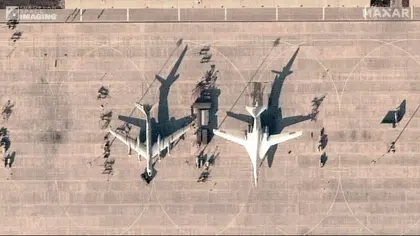According to the latest report from the Institute for the Study of War (ISW), there is no visual evidence suggesting Ukrainian troops damaged or destroyed aircraft or infrastructure at any of the four air bases targeted by drones early morning Friday, April 5.
Military analysts at ISW highlighted that geolocation footage revealed only explosions and activation of Russian air defence systems near all air bases, except for the one near Yeisk.
JOIN US ON TELEGRAM
Follow our coverage of the war on the @Kyivpost_official.
At the same time, satellite images captured on April 4, one day before the attack, unveiled a significant presence of military assets at various Russian air bases:
- At Engels air base: Three Tu-160 heavy strategic bombers, five Tu-95 strategic bombers, an Il-76 transport aircraft, and a Tu-22 bomber were identified.
- At Yeisk air base: Ten L-39 combat training aircraft, five An-26 transport aircraft, an An-74 transport aircraft, an AN-12 transport aircraft, four Su-27 aircraft, four Su-25 aircraft, one Su-30 aircraft, along with several Ka-52 and Mi-8 helicopters were observed.
- At Morozovsk airfield: A total of 29 aircraft, mostly Su-34s, were noted.
ISW analysis also reported that Ukrainian drone strikes typically target individual air bases in Russia, therefore making the coordinated strikes on four separate air bases a significant escalation in capabilities for Ukraine.
Furthermore, ISW believes that these strikes on Russian targets are a crucial aspect of Ukraine's campaign to undermine industries supporting Russian military endeavors and potential.
Kyiv Post’s intelligence sources on Friday confirmed a successful special operation by Ukraine’s Main Intelligence Directorate (НUR), during which they struck three Russian airfields late Thursday night into Friday morning.
According to the source, at least three Tu-95MS strategic bombers were damaged in the attack by unmanned aerial vehicles at the Engels-2 airfield. Seven Russian soldiers were also killed in the operation, including, presumably, bomber pilots.

North Korea’s Ballistic Missile with 1,200–3,000 km Range Spotted in Russia
“Innovative tactics and equipment were used, which came as a surprise to the enemy’s electronic warfare and air defense systems,” a source told the Kyiv Post.
In addition, Ukrainian drones struck a military airfield in Yeysk, killing four Russian army soldiers and completely burning down two enemy Su-25 attack aircraft.
Earlier on April 5, Kyiv Post reported, citing sources in the Special Services, that the Security Services of Ukraine (SBU) had destroyed at least six Russian aircraft at the Morozovsk airfield last night. The Russian Ministry of Defense announced the destruction of 53 drones.
Russian troops frequently utilize Tu-95 strategic bombers stationed at Engels air base to launch X-101/x-555 cruise missiles at targets in Ukraine.
As of 2023, Russia reportedly possessed approximately 60 Tu-95 aircraft. The potential loss of around five percent of Russian Tu-95 strategic bombers in a single strike would be notable.
You can also highlight the text and press Ctrl + Enter






